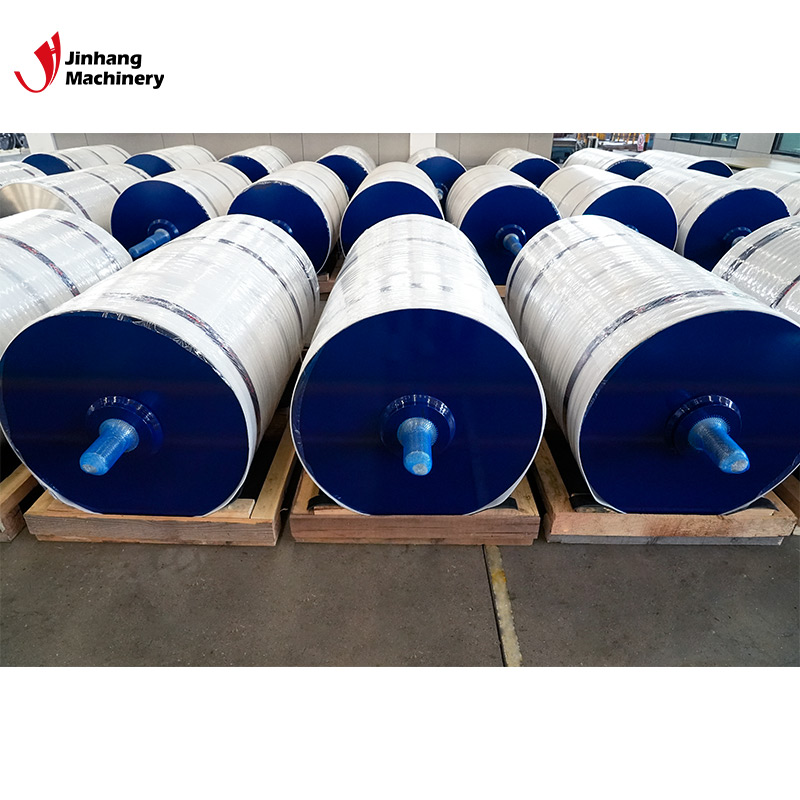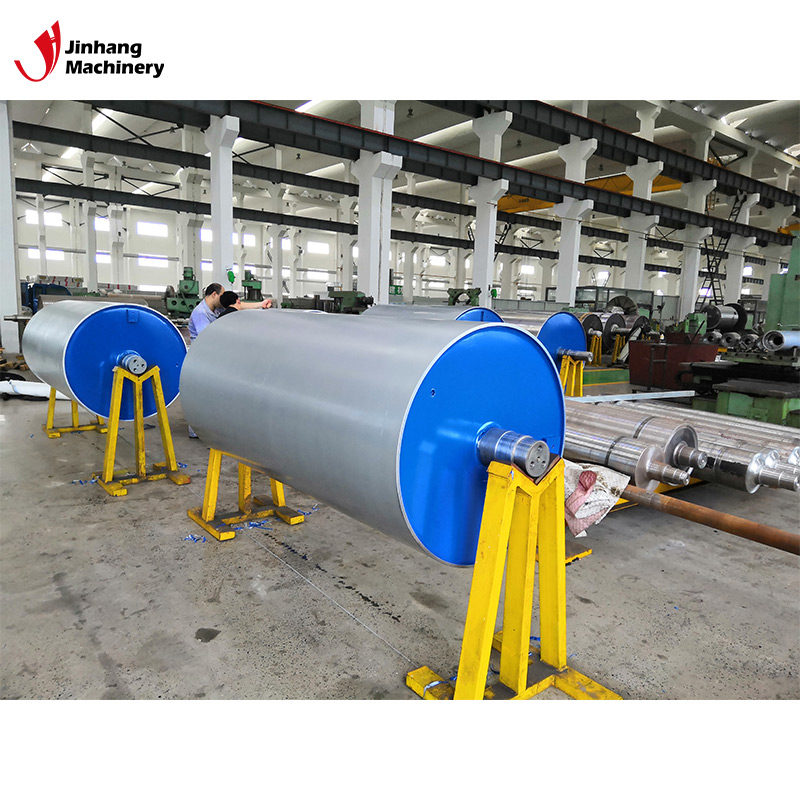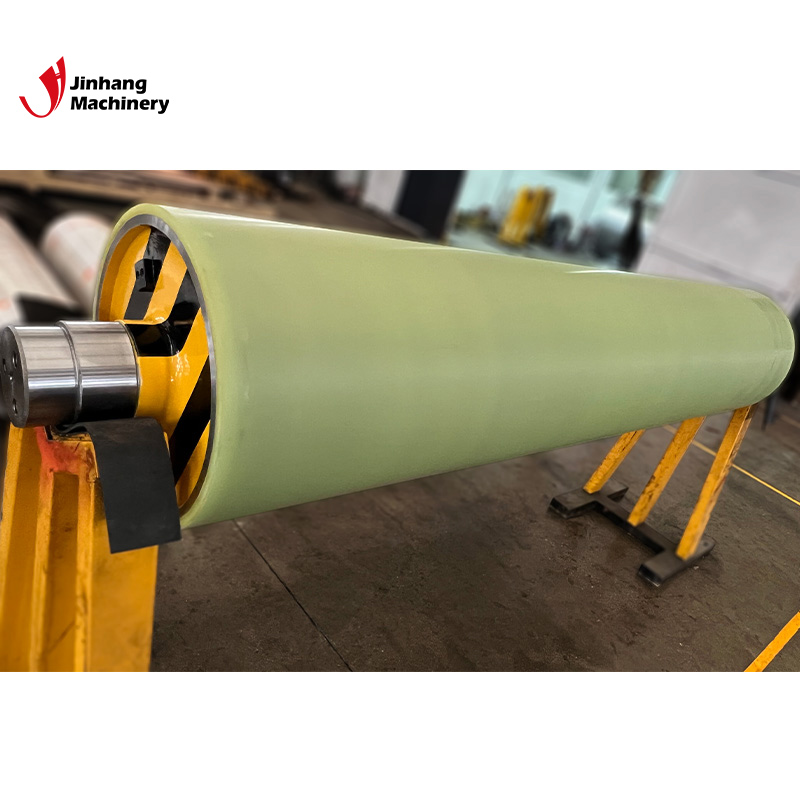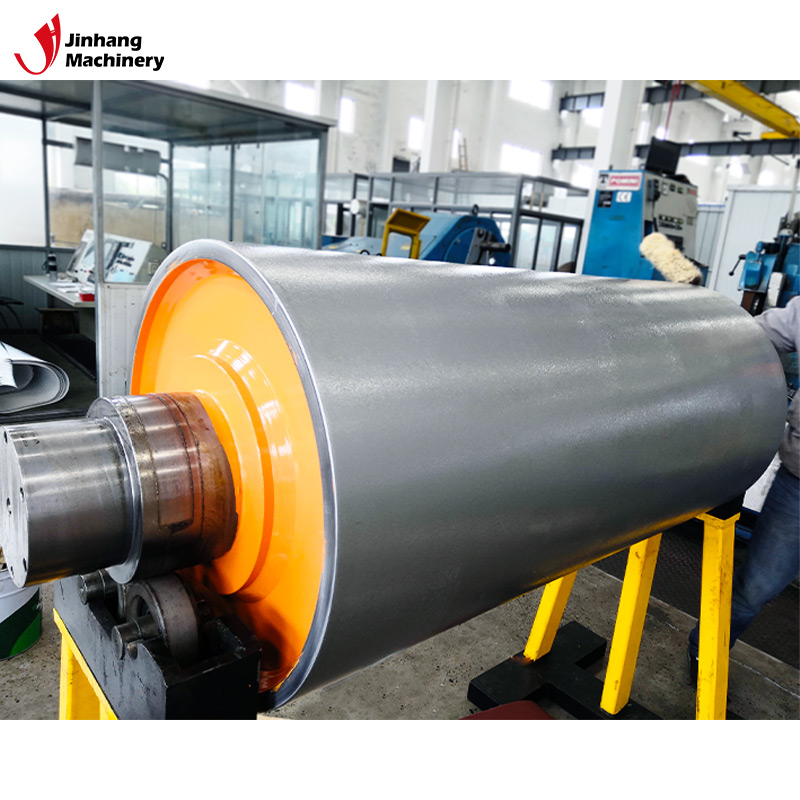What are the different types of industrial rubber rollers?
Industrial rubber rollers play an integral role in a variety of manufacturing and processing industries. They are widely used in processes such as material transfer, calendering, coating, etc., and are favored for their excellent elasticity and impact resistance. The performance and application range of industrial rubber rollers largely depend on the rubber material used. Different rubber materials give rollers different characteristics, allowing them to perform optimally in specific environments and processes.
This article will delve into the different types of industrial rubber rollers and their characteristics to help readers understand how to choose the right roller for their specific needs.

What are industrial rubber rollers?
Industrial rubber rollers refer to rollers covered with rubber or rubber composite materials. They usually consist of a core shaft of metal or other hard materials and a rubber layer covering its surface. Rubber rollers can effectively handle, convey, print or process various materials through their elasticity and friction. Its core functions include transmission, conveying, pressure application and material handling.
Rubber rollers use different types of rubber materials to cover the surface of the roller according to the use environment and functional requirements. The selection of these rubber materials depends not only on their physical properties, such as hardness, wear resistance, elasticity and tear resistance, but also on their chemical stability and environmental resistance in specific applications.
What are the different types of industrial rubber rollers?
The types of industrial rubber rollers are:
1. Silicone rollers
2. Neoprene rollers
3. Natural rubber rollers
4. Polyurethane rollers
5. Fluororubber rollers
6. Nitrile rubber rollers
7. EPDM rollers
8. Vinyl chloride rollers
9. Polyurethane rollers
10. Neoprene rollers
Depending on the different rubber materials used, industrial rubber rollers can be divided into many types. The following are the common types of rubber rollers and their characteristics:
Silicone Rubber Roller
Silicone rollers are rollers made of silicone as the main material, with excellent heat resistance, cold resistance and electrical insulation properties. They can maintain their physical properties in extremely high or low temperature environments, so they are widely used in food processing, printing, textiles, plastics and medical device industries. The tolerance of silicone rollers to extreme temperatures makes them perform well in high-temperature processes such as drying, coating and hot pressing.
Silicone roller characteristics:
● High temperature resistance: It can work normally in the temperature range of -60°C to +250°C.
● Good chemical stability: It is resistant to many chemicals and suitable for harsh environments.
● Low compression set: It maintains its shape and performance under long-term use.
Application scenarios of silicone rollers:
Silicone rollers are commonly used in industries such as food processing, medical equipment and electronic manufacturing. Due to its antibacterial properties and good thermal stability, silicone rollers perform particularly well in these demanding applications.
Neoprene rollers
Neoprene, also known as chloroprene rubber, is a synthetic rubber that is widely used outdoors and in harsh environments due to its excellent weather resistance and ozone resistance. Neoprene materials can maintain stable performance in the face of grease, fuel and a variety of chemicals, while having good weather resistance and oxidation resistance. Neoprene also has excellent mechanical properties and can withstand greater physical impact and wear.
Neoprene roller characteristics:
● Good weather resistance: Able to resist UV, ozone and other harsh weather conditions.
● Excellent oil resistance: Suitable for environments in contact with grease.
● Medium strength and elasticity: Suitable for medium-strength applications.
Application scenarios of neoprene rollers:
Neoprene rollers are suitable for petrochemical, automotive manufacturing and metal processing industries, especially in processes that require contact with oily substances or exposure to harsh environments.

Natural Rubber Roller
Natural Rubber is a natural polymer extracted from rubber trees with high elasticity and excellent wear resistance. Natural rubber rollers are known for their flexibility and good elasticity, and are suitable for applications that require high wear resistance and good cushioning performance. However, natural rubber has poor heat resistance and chemical resistance, so it is not suitable for use in extreme temperatures or highly corrosive environments.
Features of natural rubber rollers:
● High elasticity and flexibility: can provide excellent cushioning performance.
● Good wear resistance: performs well in high-wear environments.
● Excellent tear resistance: suitable for mechanical shock and vibration.
Application scenarios of natural rubber rollers:
Natural rubber rollers are widely used in occasions that require high elasticity and high wear resistance, such as paper processing, textile manufacturing, and general transportation systems.
Polyurethane Rubber Roller
Polyurethane is a high-strength synthetic material with excellent wear resistance, tear resistance, and oil resistance. Polyurethane rollers are widely popular for their durability and impact resistance, especially for heavy-load, high-wear environments. Polyurethane rollers have a wide range of hardness and can be adjusted according to specific application requirements.
Features of polyurethane rollers:
● Excellent wear resistance: suitable for high-wear environments such as heavy industrial processing.
● High strength: able to withstand large mechanical stress.
● Good chemical resistance: resists erosion by grease, solvents, and chemicals.
Application scenarios of polyurethane rollers:
Polyurethane rollers are widely used in heavy industry, mining and logistics and transportation, especially in processes that require high strength and high wear resistance.
Fluoroelastomer Roller
Fluoroelastomer (FKM) is a synthetic rubber with extremely high chemical resistance and high temperature resistance. Fluoroelastomer rollers perform well in environments with extreme temperatures and corrosive chemicals, and are widely used in aerospace, chemical and petroleum industries. Due to their excellent high temperature and chemical resistance, fluororubber rollers are particularly suitable for use in demanding environments.
Features of fluororubber rollers:
● Extremely high chemical resistance: extremely resistant to most chemicals, acids, alkalis and greases.
● Excellent high temperature resistance: maintains stable performance in high temperature environments.
● Good aging resistance: performance will not decrease significantly in long-term use.
Application scenarios of fluororubber rollers:
Fluoroelastomer rollers are mainly used in the chemical industry, high temperature production lines and aerospace fields, which have extremely high requirements for the tolerance and stability of materials.

Nitrile Butadiene Rubber Roller
Nitrile Butadiene Rubber (NBR) is a synthetic rubber material known for its oil resistance. It has excellent oil and fuel resistance and is particularly suitable for environments that come into contact with petroleum-based liquids. Nitrile rubber also has good wear resistance and mechanical strength, and can maintain performance under high load and high pressure conditions. Compared with other types of rubber, nitrile rubber is slightly less elastic at low temperatures, but still performs well in most industrial applications.
Nitrile Rubber Roller Characteristics:
● Excellent oil resistance: Excellent resistance to grease and fuel.
● Good wear resistance: Performs well in environments with high friction and wear.
● Good mechanical strength: Suitable for heavy-duty applications.
Application scenarios of nitrile rubber rollers:
Nitrile rubber rollers are commonly used in automotive manufacturing, fuel processing equipment, and hydraulic systems, especially in processes that require contact with oil substances.
EPDM Rubber Roller
EPDM is a synthetic rubber known for its weather resistance, ozone resistance, and aging resistance. EPDM rubber materials can maintain stable performance under extreme climatic conditions and have excellent acid and alkali resistance. Despite its poor oil resistance, EPDM rubber rollers still perform well in applications with high requirements for climate and environmental conditions.
EPDM rubber roller characteristics:
● Excellent weather resistance: can maintain stable performance under extreme weather conditions.
● Good ozone resistance: strong anti-aging ability in high ozone environment.
● Excellent anti-aging: suitable for long-term use.
Application scenarios of EPDM rubber rollers:
EPDM rubber rollers are widely used in building materials, outdoor equipment and wire and cable manufacturing, and are particularly suitable for use outdoors and in high humidity environments.
Vinyl chloride rollers
Vinyl chloride rollers are mainly made of polyvinyl chloride (PVC) materials and have good chemical corrosion resistance and wear resistance. Although the flexibility and elasticity of vinyl chloride materials are relatively low, their good corrosion resistance and water resistance make them popular in specific industrial applications.
Application scenarios of polyvinyl chloride rollers:
Vinyl chloride rollers are suitable for chemical processing, sewage treatment and food processing, especially in environments where corrosive chemicals are exposed or waterproof and anti-corrosion is required.
Polyurethane rollers
Polyurethane rollers are known for their excellent wear resistance, oil resistance and mechanical strength. They can maintain their elasticity and shape under high load and high pressure environments, and are suitable for industrial scenarios that require high strength and high wear resistance. In addition, polyurethane materials also have good chemical corrosion resistance and can resist the erosion of a variety of chemicals.
Application scenarios of polyurethane rollers:
Polyurethane rollers are widely used in heavy industry, mining machinery, and production lines that require high load transmission, and can effectively cope with high pressure and high friction environments.
Chloroprene rollers
Chloroprene rollers (also known as chloroprene rubber rollers) are popular for their oil resistance, heat resistance, oxidation resistance and aging resistance. They have excellent wear resistance and perform well in high load and harsh working environments. In addition, chloroprene rollers also have strong UV and ozone resistance, making them suitable for use in outdoor environments.
Application scenarios of chloroprene rubber rollers:
Chloroprene rubber rollers are commonly used in the petroleum, chemical and machinery manufacturing industries, and are particularly suitable for applications in processes that are exposed to high temperatures or require contact with oil substances.

How to choose a suitable industrial rubber roller?
When selecting industrial rubber rollers, companies should choose suitable rubber materials according to the specific working environment, such as high temperature resistance, wear resistance or chemical resistance. Secondly, consider the main functions of the roller, such as transmission, conveying, pressure application or surface treatment, to determine the required rubber type and hardness.
In addition, evaluate the environmental conditions in which the roller will be used, including temperature, humidity, chemical contact, etc., to ensure that the selected rubber material can work stably for a long time. Then select the appropriate roller size and material according to the mechanical requirements of the equipment, such as load, speed and pressure, to ensure that the roller can withstand the corresponding stress and friction.
